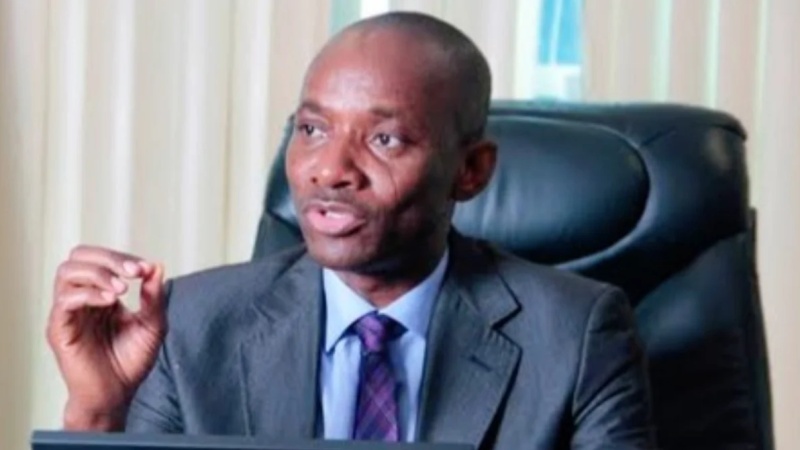

























Loading banners


NEWS EXPRESS is Nigeria’s leading online newspaper. Published by Africa’s international award-winning journalist, Mr. Isaac Umunna, NEWS EXPRESS is Nigeria’s first truly professional online daily newspaper. It is published from Lagos, Nigeria’s economic and media hub, and has a provision for occasional special print editions. Thanks to our vast network of sources and dedicated team of professional journalists and contributors spread across Nigeria and overseas, NEWS EXPRESS has become synonymous with newsbreaks and exclusive stories from around the world.

Sister of Dr. Chris Ngige, Senator representing Anambra Central of South-East Nigeria, has been indefinitely suspended from practising as a lawyer in the United States of America after being found guilty of fraud.
Ozoemena Maryrose Nwadike, according to reports in The Daily Record of Baltimore (www. thedailyrecord.com), was disbarred after a trial that dragged for years. Though the ban was handed down in August 2010, it was not reported in Nigeria, where the Ngige family is making waves in politics and legal practice, though with a fair share of scandals.
Telling the story of Ozoemena Maryrose Nwadike’s misadventure in the USA, The Daily Record reported in a story entitled “Maryland lawyer disbarred” published on August 25, 2010:
Maryland’s highest court disbarred a Montgomery County attorney Wednesday for intentionally misappropriating funds held in a trust for clients.
The Court of Appeals voted to disbar Ozoemena Maryrose Nwadike, who was admitted to the Maryland Bar in June 1992. Two of the seven judges on the panel agreed that Nwadike’s behavior deserved punishment, but recommended a lesser sanction of indefinite suspension.
The court found Nwadike improperly transferred her own money into the client trust fund and paid personal bills from it. She also deposited into the fund money ostensibly set aside for an election campaign for her brother’s gubernatorial race in Nigeria.
Nwadike’s attorney, John O. Iweanoge Jr., had recommended a reprimand or 30-day suspension. He said he was surprised at the court’s decision to disbar and is reviewing his client’s options.
“I was thinking it was a suspension case and not a disbarment case, because no clients lost any money,” he said. “It was one of those cases where there was no misappropriation whatsoever.”
But the court said even though clients did not lose money, the risk of loss over several years was considerable, given her “shoddy record keeping, commingling, and misuse of funds.
“The rule is concerned with the risk of loss, not only the actual loss,” the court explained.
The court viewed Nwadike’s “four-year pattern” of commingling funds and using them to pay personal expenses as intentional misappropriation because it subjected the client’s funds to potential creditors’ claims against Nwadike.
Bar Counsel’s office, which handles attorney grievance cases, would not comment on the disbarment.
According to the opinion written by Judge Glenn T. Harrell, the Montgomery County Circuit Court ruled against Nwadike in a civil judgment of $14,500 in August 2006, tipping the Attorney Grievance Commission off to her improper conduct. The resulting investigation unearthed a pattern of repeated misconduct with regard to her client trust account.
In that case, Nwadike’s client in a divorce proceeding, Ivo Njosa, was $14,500 behind on mortgage payments and his home was going into foreclosure. Bolly Ba’s colleague told him of the property and he expressed interest in purchasing it.
To facilitate the deal, Nwadike took the money from the trust account for the down payment and later put Ba’s down payment check back into the trust.
After a problem with the appraisal, Ba requested the return of his money, but Nwadike refused. Instead, she referred Ba to the divorce document, which granted him the chance to be reimbursed in the sale of the property. Ba filed a civil suit against Nwadike and Njosa.
Bar Counsel’s investigation also uncovered money deposited into the trust earmarked for the election campaign of Christopher Ngige, Nwadike’s brother. It found that Nwadike put her own money into the trust and issued checks from the account for personal expenses.
The Court of Appeals held that Nwadike violated several of the Maryland Rules of Professional Conduct, including safekeeping property, misconduct, required deposits, commingling funds, prohibited transactions and misuse of trust money.
Nwadike disagreed, but said in the worst-case scenario, the court might find that she had violated the safekeeping and commingling of funds rules.
She said mitigating factors were no prior disciplinary record -- although she was sanctioned with an informal admonition by the District of Columbia Court of Appeals in 2006 -- an absence of a dishonest or selfish motive, and that she would not repeat her mistakes.
However, the majority of the court said it was not moved by Nwadike’s mitigating factors and the “only sanction appropriate” was disbarment.
Judge Joseph F. Murphy, writing for himself and Robert M. Bell, said mitigating factors, like Nwadike’s effort to protect Ba with the absolute divorce provision, her record and the fact that Ba did not have his money stolen, should afford the attorney the less severe punishment of indefinite suspension.
Abraham Dash, a professor at the University of Maryland School of Law, said indefinite suspension is usually only for cases that involve substance abuse or a “nervous breakdown,” where an attorney can later reapply for readmission to the bar.
“When you’re disbarred that’s capital punishment, you’re never coming back,” he said. “In a case like this, where even the dissenters are arguing it should be an indefinite suspension, it would be tough to prove that there has been a change of attitude.”
In an earlier story entitled “Award against attorney for misappropriation” published on Oct 20, 2008, The Daily Record reported as follows:
An attorney who accepted $14,500, allegedly as repayment for a loan, improperly converted funds when she refused to return the money, the Court of Special Appeals has held.
In September 2007, the Montgomery County Circuit Court awarded Bolly Ba a $14,500 judgment against Silver Spring lawyer MaryRose Ozee Nwadike for misappropriation, as well as a $14,500 judgment against Ivo Njosa for breach of contract.
At trial, Nwadike claimed that Ba and Njosa, one of her divorce clients, asked her to loan them the money to stop a foreclosure on Njosa’s home. She said she took the $14,500 out of her escrow account and that Ba later gave her that amount in repayment.
Ba, however, said he was attempting to buy the home and that the payment was in fact his earnest money deposit.
Nwadike was unable to produce any evidence to support her assertions. Rather, evidence showed that the property had been redeemed before Ba gave the money to Nwadike.
Nwadike appealed, and the intermediate court upheld the judgment. While it found that Ba’s claim of misappropriation failed, Ba was entitled to the judgment on a claim of conversion.
“Appellant wrongfully exercised dominion over appellee’s funds and refused, on proper demand, to return it to appellee,” Judge Alexander Wright Jr. wrote for the appellate court.
The lower court should not have awarded Ba $30,000 total, though, since he only sought $14,500, Wright wrote. Ba can collect all or part of the award from either Nwadike or Njosa, the court held, as long as the total does not exceed $14,500.
•Photo shows Senator Ngige, whose name came up during the trial.